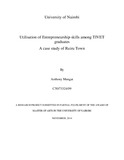| dc.description.abstract | The wealth of a nation depends on its capacity to develop its human resources and not so
much on its physical resources, and a country which is unable to develop skills and
knowledge of its people and to utilize them effectively in the national economy will be
unable to develop anything else. One of the Kenya’s approaches to skills development is
focusing on development of TIVET institutions which are required by government policy to
provide entrepreneurship training to all the apprentices. The aim is to create the enterprise
culture and assist with skills necessary to start and run business. This study’s aim was to explore
how well these skills are used.
The skills are meant to instil in trainees the drive necessary to venture into profit making
activities through knowledge, skills and attitudes that will enable them start, operates and
manage personal or group business enterprises effectively. There was a dire need to establish
whether these skills translate to business ventures among the TIVET graduates, especially when
we consider the following arguments: one is the argument that most artisans seek to start selfemployment
after failing to acquire paid jobs in the formal sector; two, the argument by the
government that only 2 out of 20 trainees given management and technical skills succeed in
business venture; and the argument that 80% of SME fail within their first year of start.
The main goal of this study was to establish whether the TIVET graduates utilise the knowledge,
skills and attitudes acquired during their training to establish business. This was done through
specific objectives that were:
1. To establish whether the graduates of TIVETs institutions use their acquired
entrepreneurship skills to establish business,
2. To establish the new innovations the graduates have brought to the market as they meet
the societal needs.
3. To establish the TIVET graduates attitude on the adequacy of their entrepreneurship
training.
This study interviewed graduates from TIVET institutions by following them to where they
work. It also interviewed artisans who trained through on-job training but are engaged in similar
ventures.
The study utilised snowballing sampling technique and data collection was through structured
interview method. Statistical Package for the Social Sciences (SPSS) was used to analyse the
data, and presented in simple tables and graphs.
The study found that thereis a sizable number of graduates trained by TIVET that is in business
just because they could not secure a paid job. Together with this there is a good number of those
in paid job because they have the fear that their business would not succeed. The study revealed
that there is need for the graduates to understand the meaning of market and have better market
analysis methods. This study also found out that product and radical innovation are missing
among the graduates. Many respondents felt that the entrepreneurship skills given to them were
adequate to assist in staring and running business. Besides, they felt that the training content
should be increased and the training should be more skill based. | en_US |

